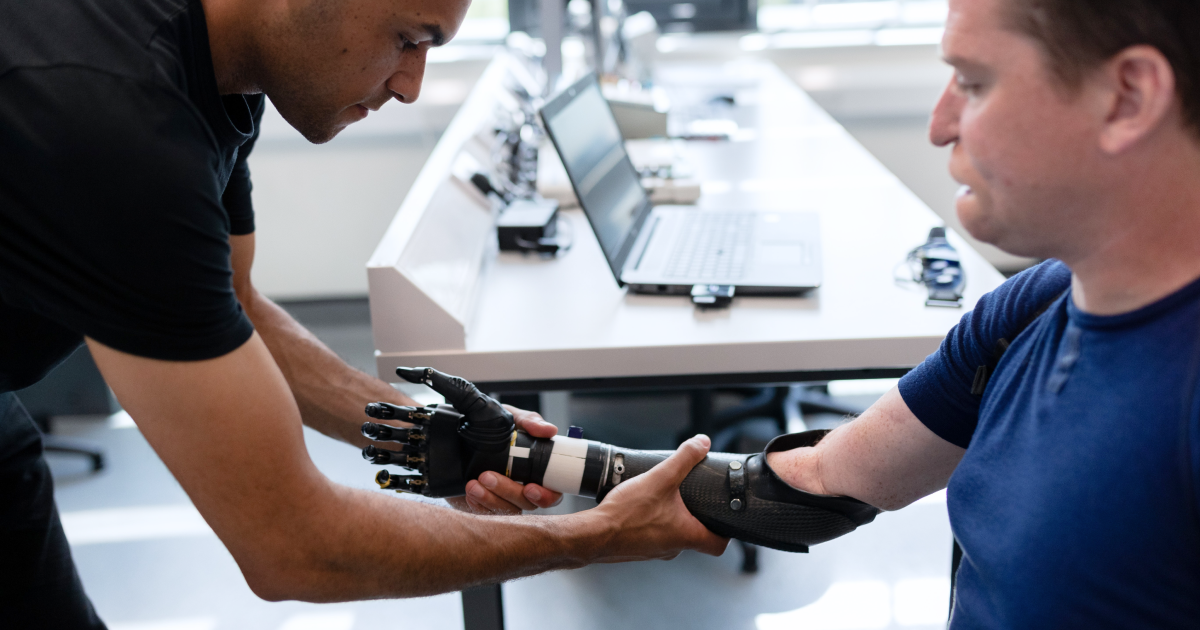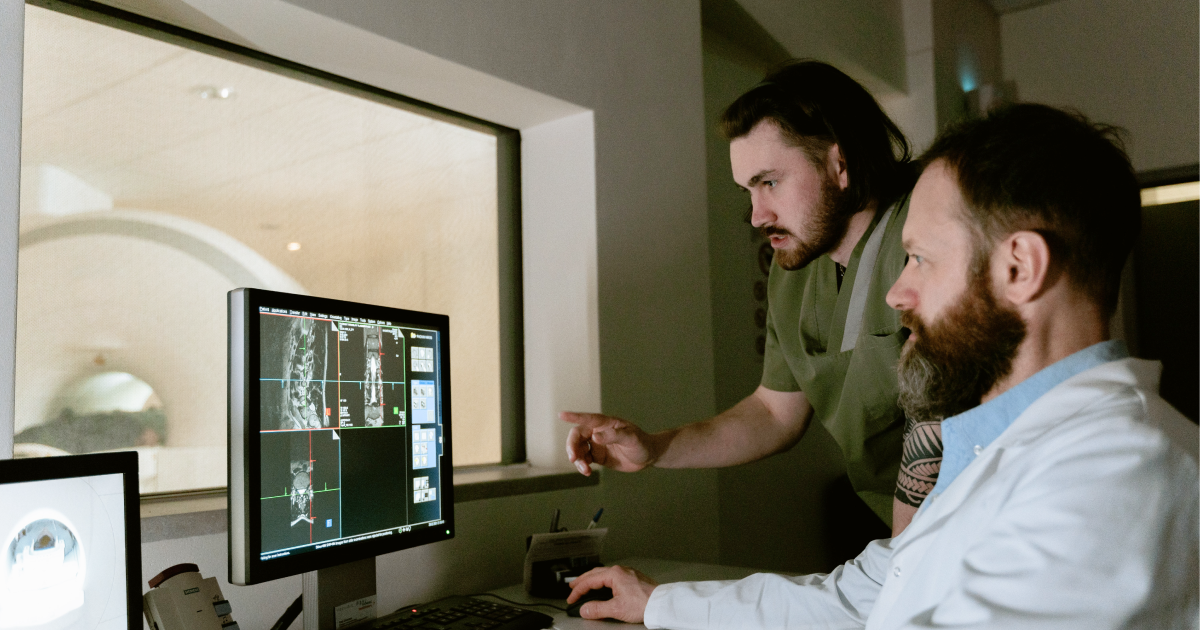A big-picture look at AI's expected impact in healthcare
Artificial Intelligence (AI) is transforming our world in countless ways, from streamlining workflows to enhancing decision-making processes. Arguably, one of AI's greatest potential areas of impact is healthcare. AI is increasingly being used to help diagnose diseases, create personalized treatment plans, and predict patient survival rates, revolutionizing the healthcare industry.
This article provides a comprehensive look at the different types of AI in healthcare – its applications, benefits, and top trends for 2023. Rather than replacing healthcare providers, AI systems can assist them in numerous areas, including healthcare analytics, personalized medicine, disease prediction, and test interpretation.
Healthcare and AI
The healthcare industry has historically been hesitant to invest in new technologies. However, with recent advancements in artificial intelligence (AI), professionals in this space have come to recognize AI's potential to revolutionize healthcare diagnosis, treatment, and prevention. Leading companies worldwide are already embracing artificial intelligence to improve healthcare. In particular, AI has the potential to provide personalized and real-time medical advice, diagnosis and treatment support, disease prediction, improved health outcomes, cost reduction, and drug development support. With the health sector facing unprecedented challenges related to staffing, provider burnout, mental health services demand, persistent care inequality, long-term pandemic response planning, and more, finding ways to leverage AI to better serve patients and providers will be crucial in the years ahead.
What is AI?
AI refers to dynamic computer systems and software that can perform tasks that would typically require human intelligence. Types of work being targeted with AI include problem-solving, learning, understanding natural language, speech recognition, visual perception, planning, and decision-making.
AI can be broadly classified into two categories:
- Narrow AI (also known as Weak AI) is designed to perform specific tasks or solve particular problems. It is limited in scope and cannot generalize its knowledge beyond the tasks it was trained to accomplish. Examples of narrow AI include speech recognition systems, recommendation engines, and image recognition software.
- General AI (also known as Strong AI or AGI, Artificial General Intelligence): is a type of AI designed with the goal of building human-level intelligence across a wide range of cognitive tasks. General AI would be capable of understanding, learning, and applying knowledge to various tasks, much like a human.
AI systems rely on approaches such as machine learning, deep learning, and neural networks, to learn from data, recognize patterns, and make decisions.
Types of AI in healthcare
As we have mentioned, AI encompasses a range of distinct yet interconnected processes. Some of the most prevalent forms of AI employed in healthcare are:
- Machine learning (ML): The process of training algorithms using datasets, such as health records, to develop models capable of tasks like information categorization or outcome prediction.
- Deep learning: A subcategory of machine learning that involves larger quantities of data, extended training times, and multiple layers of ML algorithms to create neural networks capable of performing more intricate tasks.
- Natural language processing (NLP): The application of ML to comprehend human language, whether spoken or written. In healthcare, NLP is utilized to interpret documentation, notes, reports, and published research.
- Robotic process automation (RPA): The incorporation of AI into computer programs to automate administrative and clinical workflows. Some healthcare organizations use RPA to enhance the patient experience and add efficiency to the daily operations of their facilities.

Applications of AI in healthcare
Artificial intelligence-based technologies are utilized in various ways across industries. In the healthcare field, researchers do not anticipate that AI will replace professionals in the near future, but rather envision that it will assist and enhance the work of healthcare providers. Some prevalent applications of AI in healthcare today include:
- Healthcare analytics: Machine learning algorithms are trained on historical data to generate insights, facilitate decision-making, and optimize health outcomes.
- Personalized medicine: AI creates customized patient treatment plans, considering medical history, environmental influences, lifestyle factors, and genetic composition.
- Disease prediction and prevention: By utilizing predictive models, healthcare professionals can assess the likelihood of individuals developing specific conditions or contracting diseases. They can also identify potentially compatible treatment options.
- Test interpretation and disease diagnosis: Machine learning models can be trained on standard medical scans like MRIs or X-rays to interpret and diagnose conditions like cancerous lesions.
Examples of AI in healthcare
The healthcare industry has faced numerous challenges in recent years, including staff shortages, supply disruptions, and inadequate access to equipment and facilities. Artificial intelligence can be a valuable tool in addressing these issues, with many companies already utilizing AI to improve healthcare outcomes. Some examples of AI applications transforming healthcare include:
- Dosage error prevention: AI can help determine and ensure the administration of correct drug dosages, potentially saving $16 billion (and many lives) each year by reducing preventable medical errors.
- Fraud detection: AI can improve the speed and accuracy of detecting fraudulent Medicare claims, saving up to $17 billion annually.
- AI in cybersecurity: AI can help monitor and detect abnormal interactions with health records, potentially saving $2 billion annually by reducing data breaches.
- Medical image analysis: AI can detect anomalies in medical images, outpacing radiologists and saving as much as $3 billion per year through increased efficiency.
- Virtual assistants: AI virtual assistants help care providers and staff manage clinics and save time on patient tasks, leading to $20 billion in annual savings.
- Predictive analytics: AI analyzes and interprets data, predicting patient outcomes and detecting healthcare fraud.
- Chatbots: These AI-powered conversational agents can assist with responding to general care questions from patients and reduce response burden for medical professionals.
- Automated administrative tasks: AI automates workflows, optimizes resources, and identifies diseases from medical images, potentially saving $18 billion annually by streamlining tasks, as with voice-to-text transcription.
- AI-assisted diagnosis and treatment: AI aids doctors in making data-driven decisions and treatment suggestions, as well as by offering preliminary diagnoses before emergency department visits. These abilities can save up to $5 billion each year.
- AI-powered drug discovery: AI can speed up drug discovery by identifying patterns and connections in large datasets.
- Wearable devices and sensors: AI algorithms analyze data from wearable devices to provide valuable insights for patient care.
- AI-driven genomics: AI explores genomes, predicting disease risks based on genetic makeup.
- AI-powered robotics: In healthcare, AI-assisted robotics enhance surgical procedures and explore dangerous environments to aid in emergency rescue, reducing complications and hospital stays. This could yield annual savings of $40 billion.
- AI-driven virtual reality (VR): Although still developing, VR can provide immersive training experiences for medical students and doctors.
- AI-assisted telemedicine: AI can help provide healthcare services remotely, particularly for patients far from city centers.
The anticipated cost savings cited above are derived from data presented by Accenture in their report titled "AI: Healthcare's New Nervous System."

The benefits of AI in healthcare
The medical industry is on the verge of a paradigm shift, propelled by rapid artificial intelligence (AI) technology advancements. AI is transforming numerous aspects of healthcare, including diagnosis, therapy, and administration, with the goal of improving patient outcomes and promoting more efficient care delivery. Let's look at some of the most compelling benefits of AI in healthcare and its potential to shape the future of medicine.
Early and accurate diagnoses
One of the most significant advantages of AI in healthcare is its ability to assist in early and accurate diagnoses. AI-powered algorithms can analyze medical images and pathology slides with remarkable precision, often equaling or surpassing the accuracy of human experts. This ability leads to faster diagnoses and helps avoid misdiagnoses, which can have severe consequences for patients. With AI, doctors can identify diseases earlier, leading to better treatment outcomes and potentially saving lives.
Personalized medicine
AI enables a new era of personalized medicine, tailoring treatments to individual patients’ unique genetic, clinical, and lifestyle profiles. By analyzing vast amounts of data, AI can identify specific risk factors and recommend customized treatment plans. This targeted approach can optimize therapeutic outcomes while minimizing side effects, ensuring patients receive the most effective care possible.
Accelerating drug discovery
The drug discovery process is traditionally time-consuming and expensive. However, AI has the potential to revolutionize this process by analyzing large datasets to identify potential drug candidates and predict their effectiveness and safety. This can significantly reduce the time and cost associated with drug development, bringing new and innovative therapies to patients faster than ever before.
Empowering patients with virtual health assistants
AI-powered chatbots and virtual assistants provide patients with valuable information, guidance, and support in managing their health conditions. These tools can help patients by answering questions, scheduling appointments, and sending medication reminders, allowing them to take a more active role in their healthcare and improving overall satisfaction.
Enhanced predictive analytics
AI can harness the power of predictive analytics by analyzing data from various sources, such as electronic health records, social determinants of health, and wearable devices. Healthcare providers can intervene early and avoid complications or deterioration of health conditions by identifying patterns and predicting patient outcomes.
Revolutionizing surgical procedures
AI is making a name for itself in the operating room by assisting surgeons during difficult surgical procedures. By providing real-time guidance and enhancing precision, AI can reduce the risk of complications and improve patient outcomes. Robotic surgery with AI assistance is becoming more common, ushering in a new era of minimally invasive and highly accurate surgical interventions.

Top AI trends in healthcare in 2023
Key AI-related trends in the healthcare sector include:
1. AI-powered Robotics Process Automation (RPA)
In healthcare, RPA solutions automate processes, minimize errors, and reduce costs. By 2030, the RPA market in healthcare is expected to reach $6.2 billion.
2. Increased focus on personalized healthcare
AI systems will use massive amounts of data to make accurate predictions and recommendations for personalized treatments, magnifying the impacts of customized health care.
3. Emotion AI for mental health disorders and autism
Emotion AI in telemedicine apps can assist doctors in better understanding and interpreting patients' emotions, allowing them to provide more meaningful and engaging care to patients struggling with mental health or who identify as neurodivergent.
4. Healthcare AI legislation
Advancements in legislation and regulations around healthcare AI, addressing issues such as data sharing and individual data protection, will reduce uncertainty for health tech innovators while safeguarding the rights of users.
5. Data-driven personalized healthcare
With personal vital and behavior data being collected at an increasing rate, AI can analyze data from imaging, EMR, and wearable devices to help provide personalized healthcare recommendations.
6. Revolutionizing drug discovery
AI can accelerate drug discovery and development, with the market expected to surpass $4 billion by 2027.
7. Responsible AI
More efforts will be made to tackle AI bias, with organizations using AI in healthcare implementing guidelines and oversight mechanisms to assemble and select unbiased, representative data sets and ensure responsible use.
8. Ambient Intelligence (AmI)
AmI combines AI, IoT, big data, and NLP to create adaptive environments that respond to human needs, potentially reducing patients' waiting times and automating emergency care support.
9. New applications
A wider range of healthcare applications are expected to emerge in the near future, including drug discovery, development, and tools that improve the efficiency and accuracy of medical research.
10. Smart pills
These ingestible electronic devices can provide non-invasive diagnostic imaging, vital sign monitoring, and targeted drug delivery.
11. Emphasizing collaboration
As AI begins to play a more significant role in healthcare, health tech creators and users will need to establish a healthy working relationship with AI, emphasizing the need for human oversight, consistent policies, and solid procedures.
12. Chronic disease diagnosis
AI can help diagnose and treat chronic diseases, such as heart disease, cancer, and diabetes, by analyzing vast amounts of diagnostic data for improved accuracy in treatment.
13. Improved automation
Increased automation in healthcare will be seen in tasks such as managing patient records, scheduling appointments, and coordinating care, improving efficiency and the overall patient experience.

Key takeaways
The broader adoption of AI in healthcare has opened up a myriad of opportunities for improving practices and raising our expectations for more effective treatments. The accuracy and efficiency of AI-driven solutions are expected to continually improve as technology advances, further revolutionizing the sector.
AI's impact on healthcare is multifaceted, containing potential to transform disease diagnosis, personalized medicine, drug discovery, and patient care. Early and accurate diagnoses, enabled by AI-powered algorithms, can lead to better treatment outcomes and potentially save lives by identifying diseases in their nascent stages. With the assistance of AI, doctors can make more informed decisions and devise patient-specific treatment plans, ensuring that individuals receive the most suitable care.
Furthermore, AI accelerates drug discovery by rapidly identifying potential drug candidates and predicting their efficacy and safety, thereby reducing the time and cost associated with traditional drug development. This will ultimately bring innovative therapies to patients at a much faster pace.
AI-powered chatbots and virtual health assistants empower patients by providing valuable information, guidance, and support in managing their health conditions. These tools allow patients to take a more active role in their healthcare, which can improve user outcomes and experience in meaningful ways.
In addition to these benefits, AI is poised to make significant strides in other areas of healthcare, such as emotion AI for mental health disorders and autism, data-driven personalized healthcare, smart pills, chronic disease diagnosis, and improved automation. The continued exploration and development of AI applications in healthcare promises to unlock even more possibilities and further advance the sector.





























